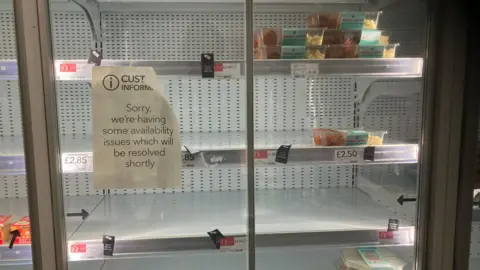The Co-op supermarket chain has announced that shoppers can expect to see their store shelves replenished and stocked more fully by this weekend. This hopeful news comes in the wake of a significant disruption caused by a cyber-attack that targeted the company’s online ordering and payment systems. This attack, attributed to a group of hackers known as DragonForce, not only threw the retailer’s logistics into disarray but also affected payment operations and resulted in a shortage of goods across its stores, creating issues for customers attempting to shop.
In the aftermath of the attack, Co-op faced several challenges, including payment processing difficulties and a severe shortage of essential products in many of its outlets. Specific details about the repercussions from this attack revealed how the hacker group also claimed responsibility for similar intrusions affecting other retailers, including Marks and Spencer (M&S). Adding to the confusion, the hackers made attempts to breach systems at luxury department store Harrods, indicating a broader trend of cyber threats targeting national retailers.
Co-op announced plans to systematically restore its operations, moving cautiously to ensure safety while bringing its systems back online. The company noted a gradual return to normalcy, indicating that both the online platforms and brick-and-mortar stores would benefit from restocked shelves shortly. The move to reactivate automated systems for ordering supplies reflects the urgency in addressing the shoppers’ complaints about empty fridges and aisles, a situation that had persisted over several weeks leading up to this announcement.
In the days preceding the announcement, there were reports that Co-op had proactively shut down parts of its digital infrastructure to stem the cyber threat and limit damage. This included halting certain logistic functionalities which resulted in interrupted deliveries. Reports from frustrated customers surfaced on social media platforms, with many sharing images that depicted bare shelves, underlining the urgency for Co-op to resolve these significant operational hurdles.
With the outlined plans for inventory replenishment, Co-op reassured its customers that payment systems, including contactless methods, have been restored and are functioning effectively. In a message of gratitude, the company expressed appreciation towards its employees, partners, and suppliers, recognizing their efforts amidst the challenges posed by this cyber incident.
The incident has raised concerns about data security, especially as the hackers claimed to have acquired private information concerning approximately 20 million members of Co-op’s membership program. However, the company has not confirmed these figures. The broader implications of this attack were underscored as M&S confirmed that some of its customer data had also been compromised during the hack, and as of now, customers have experienced ongoing issues with online ordering services at M&S nearly three weeks post-attack.
Challenges remain for both Co-op and M&S as they navigate the aftermath of these cyber incidents. In a recent communicative effort directed towards suppliers, Co-op requested patience and understanding as it works towards stabilizing order volumes, which may experience heightened variability during this recovery phase. As these two major retailers rush to restore their operations, it becomes increasingly clear that the landscape of retail is being reshaped by the persistent threat of cyber-crime. This incident not only reveals the vulnerabilities in retail IT infrastructures but also emphasizes the importance of robust cybersecurity measures to protect customer data and maintain operational integrity.
The situation at Co-op serves as a reminder of the potential impacts of cyber threats in today’s digitized economy, prompting consumers and company stakeholders alike to remain vigilant regarding data protection and security responsibilities. Such incidents shake consumer confidence and highlight the essential need for enhanced cybersecurity protocols and strategies throughout the retail sector moving forward.



